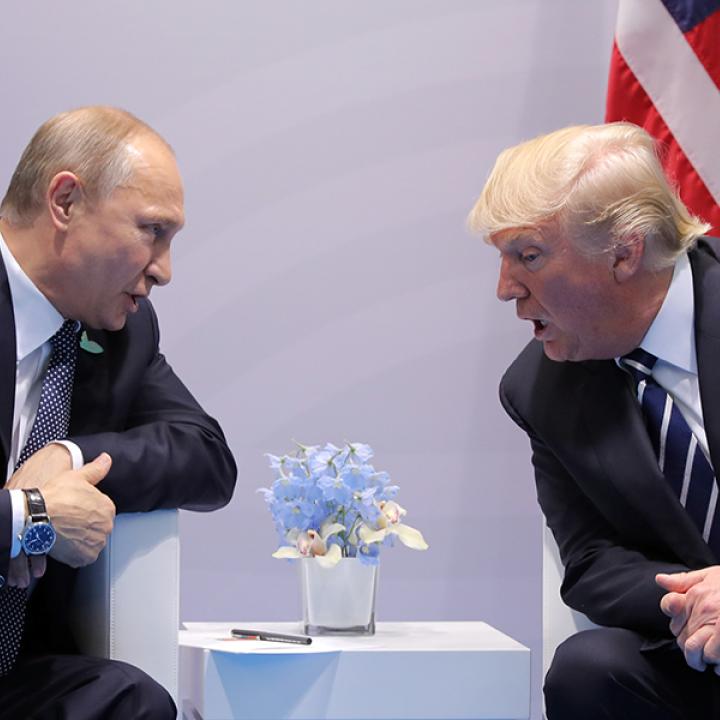
- Policy Analysis
- Articles & Op-Eds
After the Weekend's Iran-Israel Attacks, a Burden on Trump to Confront Russia and Engage Europe

Before the next shoe drops in Syria, the administration needs to get blunt with Putin and ask EU officials to warn Tehran about renewed sanctions.
Early Saturday morning, Iran crossed a threshold in trying to carry out a direct attack against Israel from Syria. Using its T-4 airbase in Homs province—a base used by the Qods Force of the Iranian Revolutionary Guard and its head Qassem Soleimani—the Iranians launched a stealth, armed drone into Israel.
Perhaps hoping to surprise the Israelis, the Qods Force was itself surprised when the Israelis not only intercepted the drone but also attacked the base and destroyed its command center and mobile launch vehicle. Advanced surface-to-air missile batteries supplied by the Russians to the Syrians then opened fire against the Israeli aircraft, and an Israeli F-16 was shot down in Israeli airspace. In response, Israel destroyed SA-5 and SA-17 missile batteries in Syria, with Israeli planes hitting 15 targets in all.
While all is quiet now, the episode should set off a loud, flashing siren about the escalatory potential that the expanding Iranian military and Shia militia presence creates in Syria. As someone who has long watched the Iranians sponsor proxy terror attacks against the Israelis at the height of our peace efforts in the mid-1990s and against American forces in Iraq, the surprise is not that the Iranians would try to hit Israel but that they would do it directly. That is potentially a game-changer and helps to explain the Israeli response, which was designed to leave no doubt with the Iranians that they are playing with fire.
Precisely because this may be a game-changer, it should also be a wake-up call for the international community and the Trump administration. Acquiescing in the continuing expansion of the Iranian military presence and infrastructure in Syria will sooner or later produce a much wider conflict involving the Israelis and Iranians and the Shia militias—several of whose leaders have provocatively visited the Israeli border recently.
In the first instance, the Russians have to change their posture. They called for restraint in the wake of the skirmish, and yet it is the Russians who have abetted the spread of the Iranian military presence in Syria. President Vladimir Putin could immediately signal the Iranians that they crossed a line with him, potentially putting Russian forces in danger with their attempted attack against Israel.
Now is the time for him to say that there will be no more Russian air cover for any Shia militia expansion from existing positions; without the Russian air support, the Qods Force advisors with the Shia militias, including Hezbollah, would be very vulnerable.
Will Putin do it? Of course, the U.S. can make it more likely that Putin will decide it is in Russia's interest to step up by conveying a long overdue message: If Russia will not act to contain the Iranian presence, the U.S. will no longer sit on the sidelines as the Iranians continue their expansion.
Until now, that is exactly what we have done. As the Qods Forces built positions and forward outposts, including one less than four miles from the Israeli border in the Golan Heights, the Trump administration has left the Israelis largely on their own. And, on their own, they have little choice but to use force to send blunt messages like they did Saturday.
It may not be President Trump's inclination to be blunt with Putin, but unless Putin sees that his current posture is likely to trigger American—and not only Israeli—responses to the Iranians and their proxies, he may not act. To be sure, Trump could tell him that the last thing either of us wants is an escalation in Syria that could draw the two of us into an unwanted conflict.
But if the Iranians are left unchecked, that is a risk we are both running. (That this past week, U.S. forces in eastern Syria decimated a Syrian regime militia—after failing to get the Russians to stop them from assaulting the Kurdish-led SDF—could lend credence to our being willing to act to contain the Iranian presence in Syria.)
To underline the message, the Trump administration should be reaching out diplomatically to the Europeans as well. They can go directly to the Iranians and say if their expansion continues in Syria, the EU will have little choice but to impose new sanctions on the Iranians for their de-stabilizing actions there.
It is possible that the aborted attack and the expanding military presence is not President Hassan Rouhani's doing but that of Soleimani and the IRGC. All the more reason to highlight the price of such adventurist behavior, particularly at a time when the demonstrations in Iran showed the Iranian public resents what Syria and Lebanon are costing them.
Policy makers don't often get crystallizing moments that tell them action is required to avert bigger dangers. But Iran's attempted attack and Israel's response is such a moment and the administration would be wise to mobilize a wide diplomatic response before the next shoe falls.
Dennis Ross is the counselor and William Davidson Distinguished Fellow at The Washington Institute.
New York Daily News



